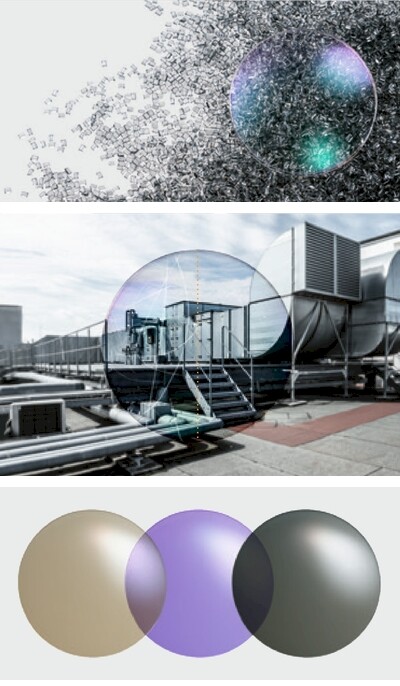Different lens coatings and surface treatments give our eyes an even more comfortable finish and a higher level of protection. Safety eyewear is perfect when it is truly custom-made. This includes taking into account all workplace conditions and potential hazards, as well as vision correction where necessary.
Anti-reflection:
Transparent lenses reflect about 8% of the light they receive. Unpleasant reflections from some surfaces, such as glass, irritate our eyes. An anti-reflective coating can increase light transmission up to 99%, eliminating irritation caused by reflected light. This layer is gummed onto the lens from both the inside and outside to ensure a glare-free experience that is especially comfortable for our eyes. It helps to significantly reduce reflections from different surfaces.
Anti-steaming effect:
The goggles can also have a special coating that provides a permanent defogging effect, which can be a great help for people who wear masks or work in more humid environments, for example.
Protection against blue light:
For those who spend a lot of time working in front of a screen with goggles, an anti-blue light coating can be a fantastic help. This not only protects them from unnaturally high levels of blue light, but also gives them a more relaxed view.
Scratch resistant layer:
In most cases, a hard coating is applied to the plastic lenses to achieve the ideal surface hardness. This ensures the lens is tough and scratch resistant.

Colouring:
Tinted lenses provide outstanding protection against intense and glaring light.
The lens can be permanently, i.e. inherently coloured, and within that you can choose between different levels of tinting depending on how dark you want the lens to be. If a coloured lens is required, you can choose between different shades of grey or brown. The choice of colour is mainly a matter of personal taste, but the colour of the frame can also be a factor. In terms of the strength of the shade, the most important factor is the environment in which you want to use the glasses.
The other option is to choose a lens that darkens in the light. In this case, the lens will automatically darken in brighter places and lighten again when it reaches a darker place. There are several transitions between the fully dark and fully light versions, as these types of lenses are fantastic at adapting to light conditions. This gives the wearer a great deal of comfort, for example when constantly moving between indoor and outdoor locations.
Foldable versions:
Special fold-up lenses are available for some types of goggles to suit specific conditions. In such cases, the dioptric lens is incorporated into the base frame – if vision correction is required – and the folding lenses are always dioptric-free.
Didímium lenses:
The didymium lenses provide a special filter layer with high absorption. As a result, they have a distinctive purple colour. They help to filter out the so-called “pale yellow sodium glare”. They are commonly used in glass production and glass processing.
Protection against X-rays:
The special grey lens is made of minerals to protect the eyes from X-rays. They can be used, for example, in work areas where some kind of material testing is carried out.

CBR65 lenses:
The name CBR65 is an acronym that stands for:
- Contrast, which provides a noticeably contrasty and pleasant visual experience, even in diffused light, preventing eye fatigue.
- Bluelight reduction, which reduces the blue light typical of extremely bright workplaces by up to 50%.
- Relaxed vision, which means that your eyes won’t get tired even during extended periods of use.
- 65% transmission, a lightly tinted lens that provides optimal protection against glare, whether from strong artificial light or natural light that challenges our eyes.
Polarisation filters:
Polarising filters absorb scattered radiation, which can be caused by reflections from a water surface or any reflective surface. They are therefore particularly ideal for workplaces where any of these conditions occur, such as waterfront environments.
Protection against welding:
This foldable lens type is ideal for autogenous welding, providing reliable protection against UV and infrared radiation. Wearing a grey tinted lens with new filter technology ensures perfect colour perception even during welding processes.
